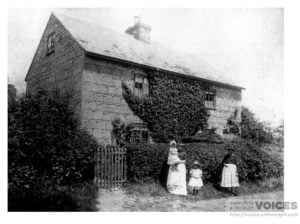Blacksmith’s Lane, that was the original bridle path, went right through the copse down by the side of the two cottages, across the stream. Hec Stone’s – it must have been his grandfather – said he used to drive a coach and horses up through the copse. The bridlepath was still up through the copse… you’ve still got the dip. Eileen Smith nee Lansdowne b 1921
The bridleway went up through the copse and over across the railway line and right through to the other road. Even when we were kids where they used to go across the stream, it was all hard gravel there. You could always get across there because it was shallower. Mike Smith b 1951
Tag Archives: Blacksmith’s Lane
Mary Henderson: Thorley, Blacksmith’s Lane 1940s
Blacksmiths Lane
My Great Gran Henderson lived in the cottage by the stream, on the corner of Blacksmith’s Lane, the one up the village side. So you had Hec Stone, whose father had been Blacksmith in the forge opposite, his family lived one side, then Great Gran Henderson came to rent hers, when James Enoch died. He’d been Chief Coastguard in Yarmouth. She moved down to Cowes eventually to a daughter, then Gran and Grandad took it on.
Gran Henderson was very strict. The children used to be over the fields playing and she used to blow a whistle to get them back, and everyone said: there’s Henderson’s whistle. She was quite horrible really because she used to put them under the stairs in a dark cupboard. Marge was asthmatic and she said: I’ll never forgive my mum for doing that. Mary Hendersonb 1954
Peter Smith: Thorley, Newclose Farm horses 1950s
Heal’s Farm (Newclose) cart horses Cornel and Warwick used to be kept in the field behind the Church. They were huge shire horses and would often come and look over the hedge at us as we went down Blacksmith’s Lane. The field there was several feet higher than the Lane so it made the horses seem even bigger. The horses were used for pulling carts around the farm and could often be seen with a two wheeled cart full of mangels that were being dropped in the fields for the cattle to eat. Peter Smith b 1946


